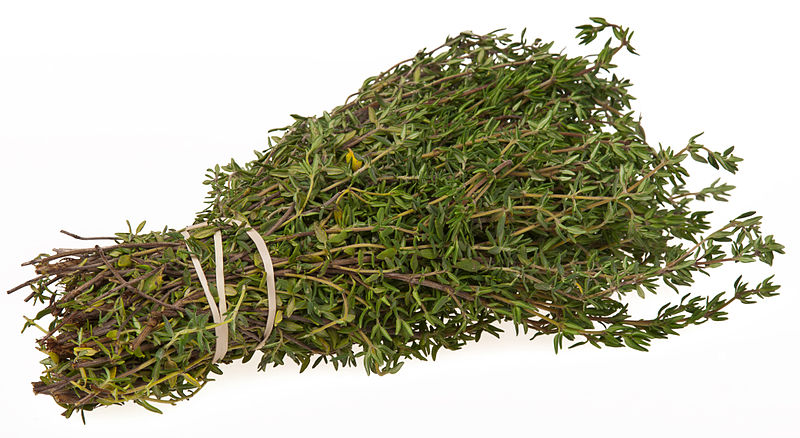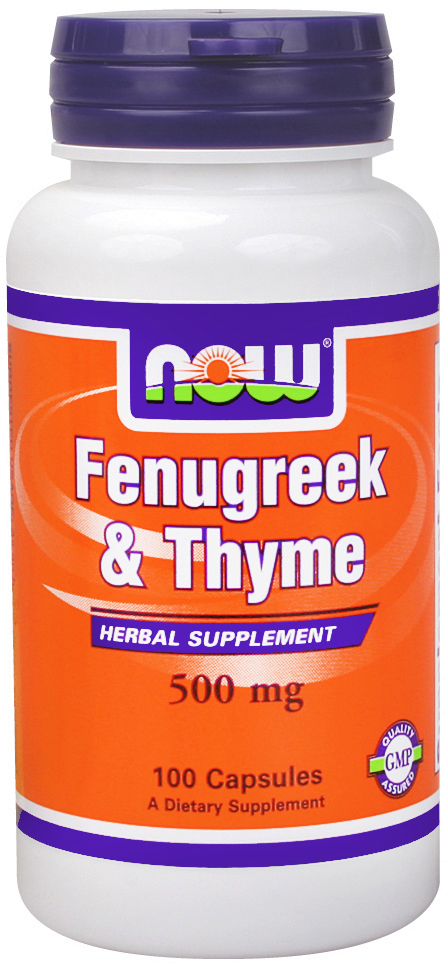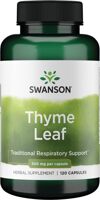Thyme, an herb from the Mediterranean, canreach 20-inches in height. The flowers are pink and white and the front of the curly-edged leaves are green with grey on the back. Thyme leaves, flowers, and oil have some varied medicinal purposes.[1, 3]
Thyme uses
In Greece, thyme was used in cooking as far back as the 4th and 5th centuries BC. They also thought the herb broughtstrength, energy, and improved memory. In England, thyme was asymbol of bravery and style. Romans also used it as aflavoring. The French added the spice to soups and other recipes,and, to add flavor to meat, fed it to animals prior to slaughter.[3]
Dietary supplement
Historically, thyme was used as an antiseptic, fumigant, andantimicrobial to help food stay fresh longer. It was also usedfor digestive problems.[3]
Folk medicine uses

Thyme is a home remedy for:[3]
- Bronchitis
- Whooping cough
- Sore throat
- Congestion
- Gas (prevention and treatment)
Other Uses
- Bloating
- Indigestion
- Skin disorders
- Rheumatism
- Diarrhea
- Bed-wetting
- Fever
- Baldness (thyme oil)
- Warts
- Urinary tract infection
- Boosting urine flow
- Bacterial and fungal ear infection (thyme oil)
- Dyspraxia (childhood movement disorder)
- Wounds
- Dental varnish to prevent tooth decay
- Mouthwash and gargle (thyme oil)
- Intestinal worms
- Appetite stimulant
- Bronchitis
Topical uses
- Sore mouth
- Laryngitis
- Tonsillitis
- Bad breath
Red thyme oil is used in perfumes, cosmetics, soaps and toothpastes.[1]
Recommended dosage
Ask your doctor what dose is best for your particular diagnosis and age, and only start a new diet or supplementation program with his or her consent.
Thyme benefits
Thyme may work for
- Acne

- Bronchitis (with either primrose root or ivy leaves)
- Bacterial and fungal infections
- Minor irritations
- Muscle spasms
- Coughing
Safety concerns
- When consumed as food in regular amounts, thyme is generally safe.
- Thyme oil is safe to use, but could cause skin irritation insome people.
- Avoid taking thyme oil by mouth.
- Consuming large doses of thyme could result in poisoning.[3]
- When taken for medicinal purposes, thyme is generally safe for ashort time.
- Research is mixed regarding the safety of thyme usage by pregnantand breastfeeding women, so it's best to avoid it.[1, 3]
- If you are allergic to oregano you may be allergic to thyme.
- Stop using thyme at least two weeks before surgery due to itspossible blood-thinning effects.
Medication interactions
Ask your doctor before taking thyme if you are on anticoagulants (blood thinners), since thyme may hinder blood clotting, too. This brings on the risk of bleeding and bruising easily.[1]
Best thyme supplements

NOW Foods Thyme and Fenugreek
You can't go wrong with several of NOW Foods' supplements. They have a fenugreek and thyme supplement that's popular with consumers.
Since "best herb" is based on personal preference, there's no way to determine which thyme supplements stand out from the crowd. Simply Organicis another manufacturer with a nice supplement lineup.
References
- Georgetown University Medical Center; "Urban Herbs: Medicinal Plants at Georgetown University"
- ScienceDaily;"Thyme May Be Better For Acne Than Prescription Creams;" March 2012
- WebMD.com; "Thyme;"
Thyme News on PricePlow
-
Apr 30, 2023 
Product News
Swanson Thyme Leaf was created.
Category: Thyme
Sign up for future Thyme news!
Click the button below to sign up for future Thyme news, deals, coupons, and reviews!